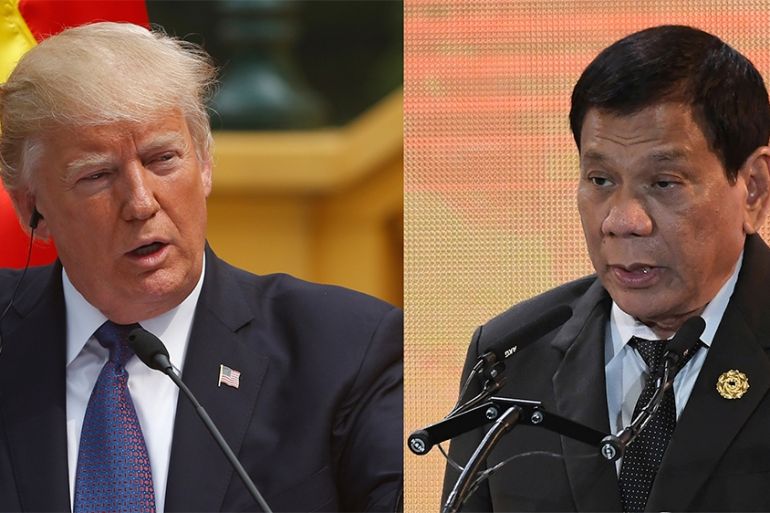Trump and Duterte: A budding bromance
After insulting the previous US president, Philippines leader Rodrigo Duterte is quite happy to welcome his successor.

The much-anticipated meeting between two of the world’s most controversial leaders is set to take place on November 13. US President Donald Trump is expected to hold bilateral talks with his Filipino counterpart, Rodrigo Duterte, ahead of the East Asia Summit in the Philippines.
By and large, many are expecting a convivial hobnob between the two populist leaders, who have promised to make their respective nations great again. While some have welcomed the burgeoning Duterte-Trump bromance as a much-needed respite for a troubled alliance, others have been critical of the US president’s open embrace of strongmen like Duterte.
A troubled alliance
During his early months in office, Duterte repeatedly insulted US officials, including former President Barack Obama who criticised his bloody drug war. Duterte’s scorched-earth campaign has reportedly claimed thousands of lives since 2016, drawing condemnation from human rights groups, international media and Western capitals.
Amid growing disagreements with traditional allies like Washington, Duterte adopted an “independent” foreign policy, which saw the Philippines drawing closer to China and Russia. In return, US’ chief rivals offered state-of-the-art weapons and large-scale investment deals.
It must be said that Trump and Duterte also share ideological affinity.
Within months, Duterte downgraded security ties with America, threatening to expel US soldiers stationed in the Philippines and cancelling major war games in the contested South China Sea. He also restricted US access to Philippine bases under the newly implemented Enhanced Defense Cooperation Agreement.
All of a sudden, the US seemed on the verge of losing its oldest ally in Asia, with China rapidly filling in the vacuum. The election of Trump, however, precipitated an unmistakable recovery in bilateral ties.
In particular, this was due to the Trump administration’s explicit and conscious decision to prioritise strategic cooperation with Asian allies over promotion of human rights and democracy values. The Filipino president, who has consistently shunned criticising Trump, has been visibly pleased.
Birds of a feather flock together
If anything, Duterte has been all praise for Trump in the past year, welcoming closer bilateral cooperation against common concerns such as terrorism. Ahead of his meeting with the US president, he promised that his country will “remain to be the best of friends with America”.
In return, senior officials from the Trump administration, particularly Secretary of State Rex Tillerson, have rarely discussed human rights concerns during their meetings with Duterte.
According to leaked documents, the White House even supports Duterte’s anti-drug campaign. The US president went as far as praising the Filipino leader for doing an “unbelievable job on the drug problem”.
It must be said that Trump and Duterte also share ideological affinity. They are both besieged populists, who present themselves as the true representative of “the people” against the liberal establishment.
Deeply unpopular at home, Trump has openly embraced and seemingly envies international strongmen, who exercise almost total control over their respective countries. As for Duterte, he relishes the support and attention of global leaders like Xi Jinping and Vladimir Putin.
But there are also pragmatic factors at play. Duterte has recognised, albeit reluctantly, the significance of US alliance in moments of crisis.
Ties that bind
When ISIL-affiliated fighters laid a months-long siege on Marawi, the Philippines’ largest Muslim majority city, Washington provided desperately needed Special Forces assistance, high-grade intelligence, and weapons to the Philippine military.
Philippine Defence Secretary Delfin Lorenzana, a former defence attache in Washington, thanked the US for playing a “vital” role in defeating ISIL elements in Marawi. Duterte has also acknowledged the deep and unshakable bond between the Pentagon and Philippine military, which has played a key role in shaping and taming the Filipino president’s erratic defence policy.
During his meeting with Trump, Duterte is expected to discuss ways to enhance counter-terrorism and counter-narcotics cooperation, where both allies share common concerns. It’s doubtful, though, whether there will be any substantive discussions on trade and investment issues as well as the South China Sea, where Duterte is exploring joint energy development with Beijing.
The two leaders will also tackle continued cooperation in areas of disaster relief and humanitarian assistance, given the Philippines’ vulnerability to extreme weather events. Duterte, however, made it clear that he won’t welcome any discussion on human rights lest he will tell the US leader to “lay off”.
Though the US administration has been under pressure to raise Duterte’s drug war in Manila, Trump will likely focus on building rapport and personal friendship with his Filipino counterpart.
It is far from impossible to expect an all-smiling picture, showing the two leaders making the controversial Duterte fist bump gesture after their meeting. Duterte is determined to show that even the US president is behind him, while Trump is eager to display his personal diplomacy and ability to win back estranged allies.
This will likely anger their liberal critics at home, but will keep one of the world’s longest-standing alliances on an even keel. In many ways, Trump and Duterte are a perfect match and will likely keep their bromance going over the coming years.
The views expressed in this article are the author’s own and do not necessarily reflect Al Jazeera’s editorial policy.
